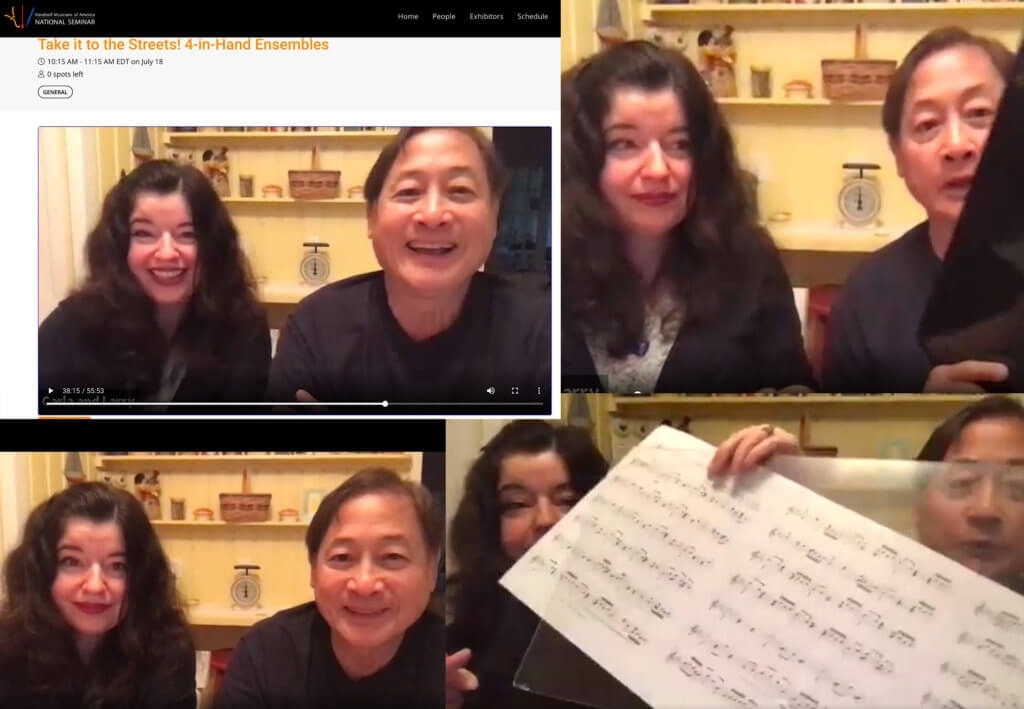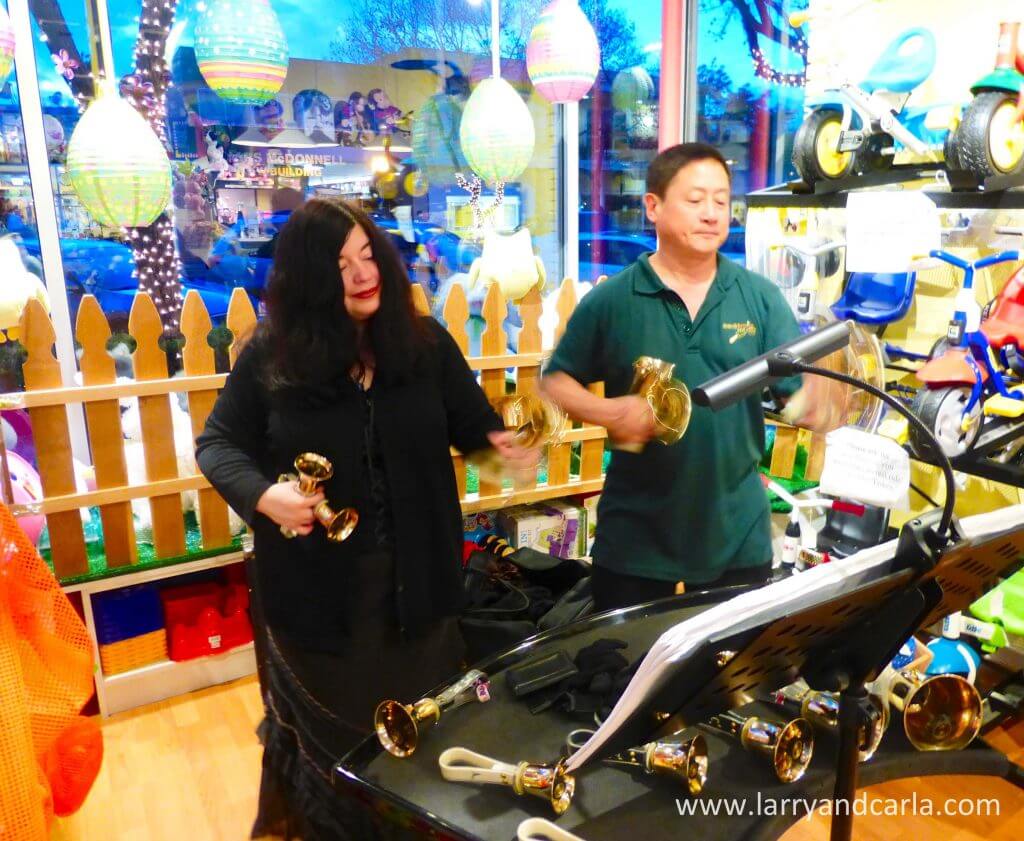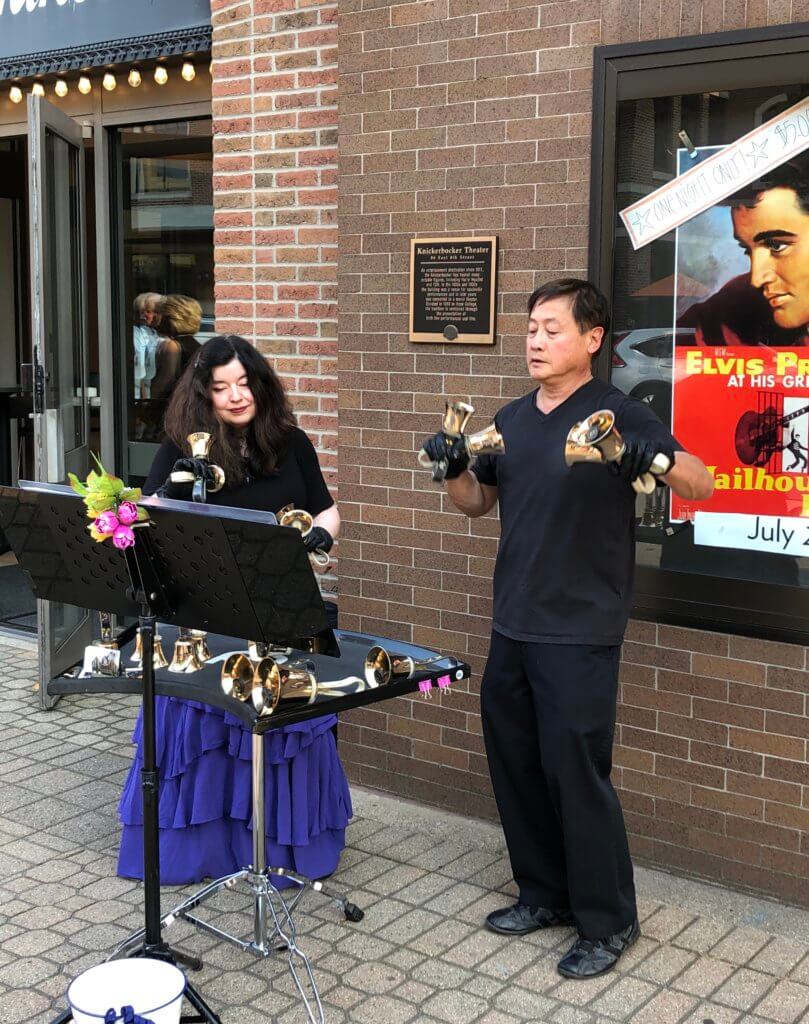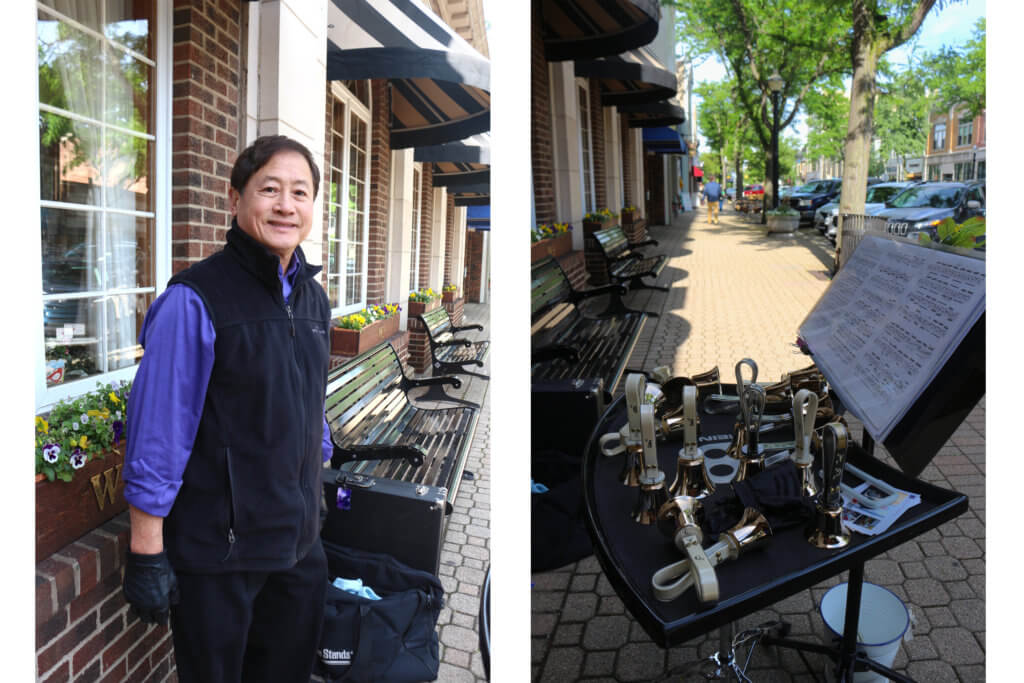The Handbells of America 2020 National Seminar went completely online in 2020, and we had the opportunity to teach an online class called Take It to the Streets! The class was held as a Zoom discussion, and we enjoyed sharing our thoughts and experiences of street performing.

Our experience with street performing
We’ve done a lot of street performing since we started playing duets together in 2012. We’ve played at events such as the Los Altos First Friday! event in California, and the Downtown Holland Street Performer Series here in Michigan. We’ve also given impromptu handbell duet performances in airports, in front of churches, and in national parks such as Yosemite and Lake Tahoe. We’re regular performers at the annual Kerstmarkt, a European-style Christmas market in Holland, Michigan.


Handbells have long been associated with churches, concerts, and Christmas performances, which brings us to the question:
Why take handbells to the streets?
There are still people out there who haven’t heard handbells before.
Those of us who are familiar with handbells are often surprised when someone says, “I’ve never heard these before!”. However, lots of people don’t regularly attend church, and wouldn’t go to a concert given by an unfamiliar band. Taking handbells out of the churches and concert halls gives us the opportunity to share music with a whole new group of people!
It can be great for publicity and/or recruitment.
Is your handbell choir giving a concert soon? If you want to attract an audience, a street performance can be a good way to introduce people to your music. You can also use it as an opportunity for someone to hand out flyers or postcards to advertise the event. If you play for weddings, or Christmas/holiday events, it’s a much better way to get seen by local people than by just advertising on your handbell choir’s website. Are you thinking of recruiting new members for your group? You will often find people who are interested enough to ask questions and want to see the bells at close range. That’s when you seize the chance to find out if they might want to learn more!
It can be a way to raise funds for your group.
We say this with caution, though. If raising money is going to be your only motivation for street performing, then we’d recommend that you pick your location and time carefully. On the other hand, maybe don’t do it at all. In our experience, Christmas performances tend to be the most popular, when people are full of holiday spirit and generosity. You might even get some sympathy money for being outdoors in winter time. Generally, though, it’s better to think of street performing as an opportunity for community involvement. There’s a warm and fuzzy feeling that counts for a lot when you’re doing something you enjoy, and participating in some kind of community event with local people.
It can be a low-stress rehearsal opportunity.
Again, we say this with caution. A street performance can sometimes be a way to play through some of your music that isn’t quite concert-ready. Sometimes the music you’re playing is something you’ve put together quickly for the occasion, and not your group’s usual concert or worship service repertoire. Most people walking past won’t even notice the occasional wrong note, and those who do will be forgiving. Having said that, people will take videos and photos on their phones, so make sure you don’t appear completely unskilled. Bear in mind that there’s a high risk that the mistakes you make could end up on social media! We all have our moments, though, and if something goes wrong, treat it as an opportunity to demonstrate that handbell-playing is a skilled art, and not as easy as some people imagine!
How many ringers do you need?
Enough to play the music! Using 4-in-hand is ideal for this, because you’ll generally want to make as much music as possible without taking up too much room. Three people could play 12-bell music, or two people could play 8-bell music, with more people if you have space. You’ll have to be the judge of that, depending on where you’re planning to play. This is where 8- and 12-bell music really comes into its own. Even if you don’t have ringers who play 4-in-hand, a group of four people can often fit into the space available on a street, and 8-bell music can work very well.
What else do you need?
You might need a permit! There are some locations where you won’t need one, but check first. For example, in Holland, every street performer must apply for a permit, which costs around $25 for the year. The permit must be displayed during performances, and there are only certain locations where performances are allowed. There are also time limits for each performance. In our experience, you’re less likely to need a permit if you’re not collecting money for your performance. We’ve given impromptu performances at Yosemite National Park, outside random churches, and in the woods at Lake Tahoe. We were viciously attacked by flying termites there, but had fun anyway.
Apart from the musicians, you’ll obviously need handbells or chimes. You’ll also need music stands, and probably somewhere to “park” your bells between pieces or during rest breaks. For example, you could have one table for your group to share, or some soft fabric or padding on the ground at the base of each music stand. That way, the bells can be safely put down when you need to change your music or rest your arms. If you plan to collect tips, have a container (bucket, jar etc) somewhere visible, but not where it’s going to trip anyone over. You might also need amplification, but check the rules about that before you rush out and buy equipment, Remember, too, that you probably won’t have access to a power supply.
Choosing your music
There’s a lot of music available that’s ideal for street performing. Look for 8-, 12- and 16-bell music, depending on the number of ringers and bells you have. Ideally, you need music that doesn’t involve any accidentals or bell-switching during (or even between) pieces, so that you won’t need to worry about tables or foam. It’s also wise to choose music that doesn’t require any page turns. We use sheet music from Choraegus for all our street performances.
When choosing your music, be aware that arrangements for small groups vary in their complexity and challenges, and consider things like:
What will your repertoire be?
Think about where you’re planning to play, and who your audience might be. If you’re representing a church, it’s no problem if your repertoire consists mainly of hymns. If you’d rather people didn’t ask you which church you’re from, you might want to include some folk tunes and classical arrangements in your street performance. We’ve found that Irish jigs work well! A variety of different types of pieces will help your performance appeal to more people. Is it music that can be played without mallets, singing sticks, or techniques that need tables (e.g. martellato)? Street performing is definitely simpler if you stick with pieces that need bells only.
Who’s going to play it?
Are your ringers experienced musicians? Are they quick to learn new music? Comfortable with four-in-hand techniques, and tricky rhythms?
How much rehearsal time do you have?
For street performing, you need a fairly large number of pieces that you can put together in a fairly short amount of rehearsal time. If you go to a performance armed with three or four beautiful pieces, you can be certain that someone will park themselves on a bench near where you are and expect to be entertained for a full hour. Remember that a handbell piece doesn’t need to be difficult in order to be beautiful or meaningful to your audience. A simple piece played well can often be more effective than a tricky piece you don’t have enough rehearsal time to master.
We recommend the Surprisingly-Easy 8-bell music from Choraegus, which is available as individual pieces, and also as collections.
The pressures and pitfalls of street performing
Weather disasters:
Unexpected bad weather is more of a problem here in Michigan than it was in California. If it’s a rainy day, street performing is usually not a good idea. However, we’ve played in windy conditions often enough that we now have a sheet of transparent plastic that goes across the top of our music and stops sheets of paper flying away in the breeze. It works better than clothes pins! Note that we also have a sheet of black plastic that goes under our music and increases the width of the music stand enough for three-page music to fit across it.

Playing in hot weather can be a challenge too. Try to find a shady spot to play in, and take cold drinks with you. (Related point: locate the nearest restrooms when you reach your performance location, but try not to interrupt your performance too many times!)
Feeling unappreciated:
It helps to develop a thick skin for street performances. Not everyone passing by will love what you do, and most people won’t give money either. On a bad day, someone might even yell something abusive at you (yes, we’ve experienced this), and you have to keep playing, and remember that you’re doing this for the sheer love of making music. If even one person smiles and says something nice, then you can rest secure in the knowledge that your entire performance has brightened someone’s day and is therefore worth every sweaty/windswept minute. If no one says anything nice, and you make $6 for two hours of ringing, well… we won’t go there. Keep smiling.
Background noise or competition from other performers:
This is probably the challenge that we find hardest to cope with. In a busy downtown street, you might find that another performer will set up just a short distance away from you. You can be sure that their music will be AMPLIFIED. It won’t be in tune with your music, and their drum will beat to a different time signature. Beware of jugglers, magicians, dance groups and anyone whose main purpose is to entertain children. Their act will not only be far louder than the sweet music of your handbells, but will also be more popular. They will probably make a lot more money. Remember to smile and look happy through your gritted teeth. We love handbells. We love handbells. Really, we do. Complain afterwards at your leisure.
Interruptions from passers-by:
Some people will be entranced by your music, your bells, and your unusual talent. They will ask questions, such as “Ooh, how do you do that?”, “Are these plugged in somewhere?”, or (here in West Michigan) “Which church are you from?” Practise saying simple phrases like “thank you” and “just a moment and I’ll be with you” while rehearsing. It can be helpful to have an extra group member with you to answer questions and say “please don’t touch that” to anyone whose hand reaches out to connect with anything bronze and shiny.
Try it! You might have a lot of fun!
We hope you might be encouraged to give street performing a try. Even with the pressures and pitfalls, it can still be a lot of fun! If you have any questions, you’re always welcome to contact us, and we’ll do our best to help!